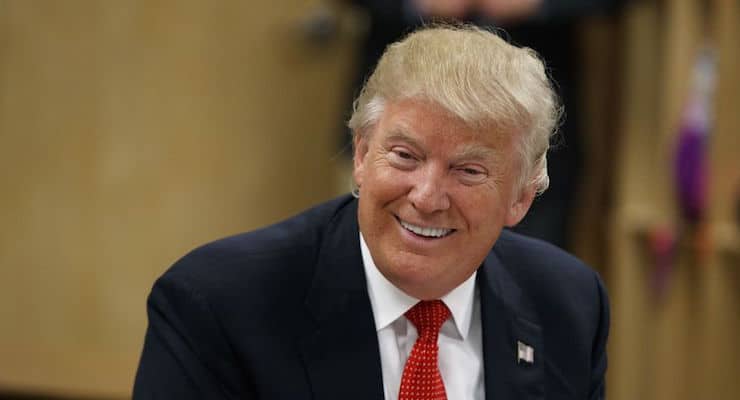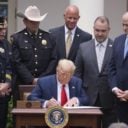

Republican presidential candidate Donald Trump smiles as he meets with students and educators before speaking about school choice, Thursday, Sept. 8, 2016, at Cleveland Arts and Social Sciences Academy in Cleveland. (Photo: AP/Evan Vucci)
Ordinarily, it is not a good idea to base how you vote on just one issue. But if black lives really matter, as they should matter like all other lives, then it is hard to see any racial issue that matters as much as education.
The government could double the amount of money it spends on food stamps or triple the amount it spends on housing subsidies, and it will mean very little if the next generation of young blacks goes out into the world as adults without a decent education.
Many things that are supposed to help blacks actually have a track record of making things worse. Minimum wage laws have had a devastating effect in making black teenage unemployment several times higher than it once was.
In my own life, I was very fortunate when I left home in 1948, at age 17 — a high school dropout with no skills or experience. At that time, the unemployment rate of black 16- and 17-year-old males was 9.4 percent. For white males the same ages, it was 10.2 percent.
Why were these unemployment rates so much lower than we have become used to seeing in later times — and with very little difference between blacks and whites?
What was different about those times was that the minimum wage, established in 1938, had been rendered meaningless by a decade of high inflation. It was the same as if there were no minimum wage.
In later years, as the minimum wage was repeatedly raised to keep up with inflation, black teenage unemployment from 1971 through 1994 was never less than 3 times what it was in 1948, and ranged as high as more than 5 times the 1948 level. It also became far higher than the unemployment rate of whites the same age.
The relations between the police and the black community are another issue that has gotten a lot of attention, and produced counterproductive results. After all the rhetoric and all the efforts towards more tightly restraining the police, the net result has been that murder rates have soared in cities where that policy has been followed — and most of the people killed have been black.
None of the most popular political panaceas for helping black communities has a track record of making things better, and some have made things much worse.
The one bright spot in black ghettos around the country are the schools that parents are free to choose for their own children. Some are Catholic schools, some are secular private schools and some are charter schools financed by public school systems but operating without the suffocating rules that apply to other public schools.
Not all of these kinds of schools are successes. But where there are academic successes in black ghettos, they come disproportionately from schools outside the iron grip of the education establishment and the teachers’ unions.
Some of these academic successes have been spectacular — especially among students in ghetto schools operated by the KIPP (Knowledge IS Power Program) chain of schools and the Success Academy schools.
Despite all the dire social problems in many black ghettos across the country — problems which are used to excuse widespread academic failures in ghetto schools — somehow ghetto schools run by KIPP and Success Academy turn out students whose academic performances match or exceed the performances in suburban schools whose kids come from high-income families.
What is even more astonishing is that charter schools are being opposed, not only by teachers’ unions who think that schools exist to provide guaranteed jobs for their members, but also by politicians, including black politicians who loudly proclaim that “black lives matter.”
Apparently these black children’s futures do not matter enough for black politicians — including the President of the United States — to stand up to the teachers’ unions. The teachers’ unions produce big bucks in campaign contributions and big voter turnout on election day.
Any politician, of any race or party, who fights against charter schools that give many black youngsters their one shot at a decent life does not deserve the vote of anybody who really believes that black lives matter.






